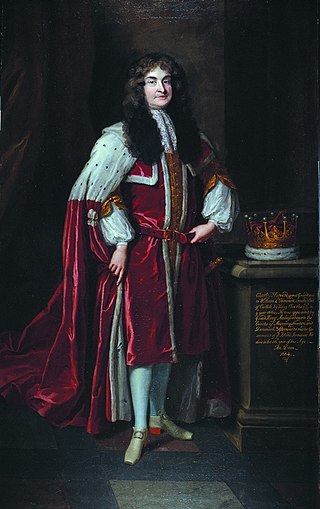Related Research Articles

Charles Howard, 1st Earl of Carlisle was an English military leader and politician who sat in the House of Commons at various times between 1653 and 1660 and was created Earl of Carlisle in 1661.

Sir Isaac Penington was an English politician who sat in the House of Commons from 1640 to 1653. He was Lord Mayor of London in 1642 and a prominent member of Oliver Cromwell's government.
Sir Alan Henry Bellingham, 4th Baronet, was an Anglo-Irish Conservative Member of Parliament. He was Justice of the Peace, High Sheriff of Louth and Lord Lieutenant of Louth. He was Senator of the Royal University of Ireland and Private Chamberlain to popes Pius IX, Leo XIII and Pius X. He was the father of the diplomat Sir Edward Bellingham, 5th Bt. and the uncle of Sir Evelyn Wrench, editor of The Spectator.
There have been three baronetcies created for persons with the surname Bellingham, one in the Baronetage of England, one in the Baronetage of Ireland and one in the Baronetage of Great Britain. As of 2014 one creation is extant.
James Philipps was a Welsh politician who sat in the House of Commons between 1653 and 1662. He was a supporter of the Parliamentary cause during the English Civil War.
Sir Audley Mervyn of Trillick (1603?–1675) was a lawyer and politician in seventeenth-century Ireland. He was MP for County Tyrone and Speaker of the Irish House of Commons 1661–1666.

John Fowke was an English merchant and politician. He served as a Sheriff of London for 1644 and Lord Mayor of London for 1652.

The Restoration of the monarchy began in 1660. The Commonwealth of England, Scotland and Ireland (1649–1660) resulted from the Wars of the Three Kingdoms but collapsed in 1659. Politicians such as General Monck tried to ensure a peaceful transition of government from the "Commonwealth" republic back to monarchy. From 1 May 1660 the English, Scottish and Irish monarchies were all restored under King Charles II. The term Restoration may apply both to the actual event by which the monarchy was restored, and to the period immediately before and after the event.
Sir Hugh Bethell was an English politician who sat in the House of Commons at various times between 1654 and 1679.
Sir Henry Peckham (1614–1673) was an English landowner, lawyer, judge, administrator, and politician who sat in the House of Commons as MP for Chichester in Sussex at various times between 1654 and 1673.
Jeremiah Tolhurst (1615–1671) was an English tailor, soldier, businessman and politician who sat in the House of Commons at various times between 1654 and 1660. He fought in the Parliamentary army in the English Civil War.
Henry Whithed was an English soldier and politician who sat in the House of Commons at various times between 1660 and 1680.

Sir George Rawdon, 1st Baronet (1604–1684), of Moira, County Down which he founded, was an English army officer and politician.

Sir John Perceval, 1st Baronet was a substantial landowner in Ireland. He was knighted by Henry Cromwell for his services to the Commonwealth government of Ireland during the Interregnum. Shortly before the Restoration, he held the offices of Chief Prothonotary of the Common Pleas and Clerk of the Crown. After the Restoration, he was granted a baronetcy and given a full pardon for his activities during the Interregnum. He was appointed Privy Councillor to King Charles II, a Knight of the Shire for County Cork, and was a member of the Council of Trade.
John King, 1st Baron Kingston was an Anglo-Irish soldier during the Wars of the Three Kingdoms who served the Commonwealth government during the Interregnum and government of Charles II after the Restoration.
Sir Henry TichbornePC (Ire) (1581–1667) was an English soldier and politician. He excelled at the Siege of Drogheda during the Irish Rebellion of 1641. He governed Ireland as one of the two Lord Justices from 1642 to 1644. In 1647, he fought under Michael Jones against the Irish Catholic Confederates in the Battle of Dungan's Hill. He was given the Beaulieu Manor by Cromwell and its possession was confirmed to him at the Restoration.
Maurice Berkeley, 3rd Viscount Fitzhardinge, known as Sir Maurice Berkeley, Bt from 1660 to 1668, was an English politician, of the Bruton branch of the Berkeley family.
John Ponsonby (1608–1678) was a colonel in Oliver Cromwell's army during the Irish Confederate Wars, a member of parliament for two different Irish counties following the Parliamentarian's victory and a significant landowner granted confiscated properties in Counties Donegal, Kilkenny and Limerick.
Sir Daniel Bellingham, 1st Baronet, was an Anglo-Irish merchant and official in the Dublin Castle administration of Ireland.
Thomas Bellingham was an Anglo-Irish soldier and politician.